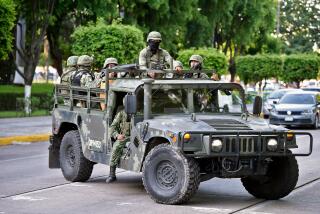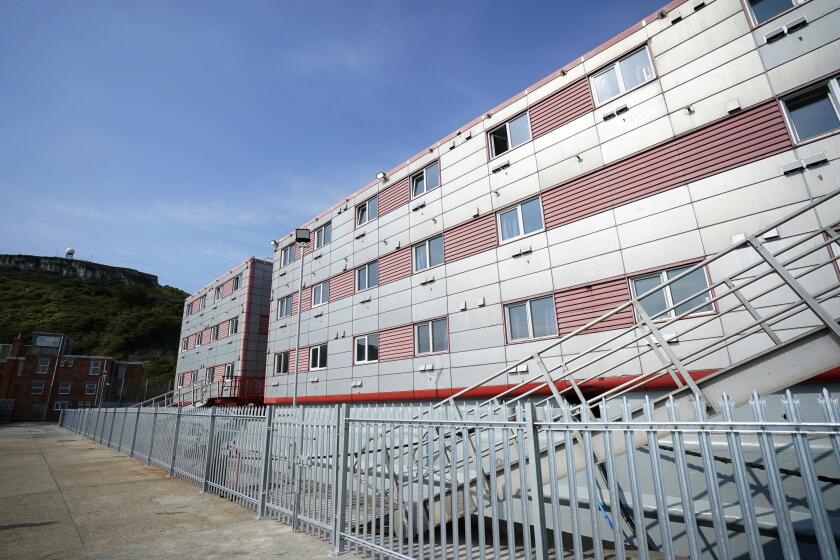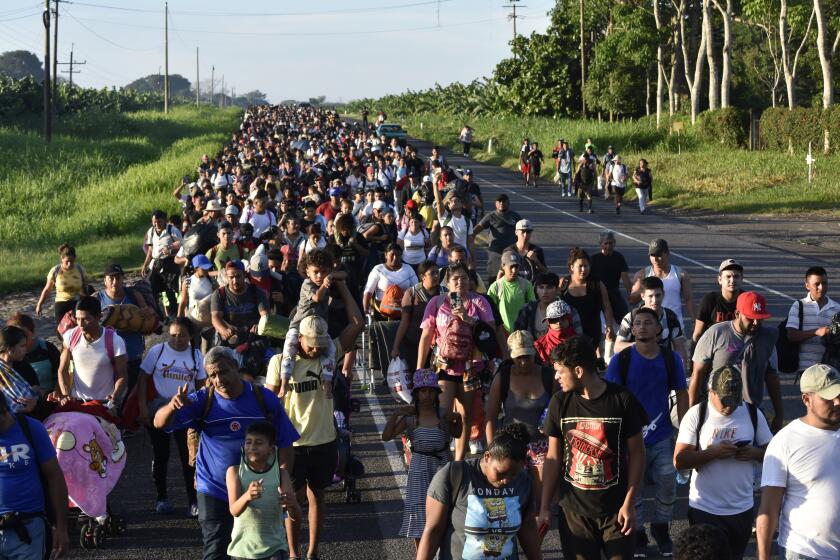Road North : Human Toll in Border Patrol’s Hunt for Illegal Immigrants
My blissful Sunday morning drive up Interstate 5 was interrupted by a quick lesson in international human relations, North County-style.
To my left, in the fast lane, a U.S. Border Patrol van was speeding along. The two officers in front continually glanced in my direction. Soon, I realized they were looking past me, at an old, beaten-up Toyota in the lane to my right. The car was carrying four young men who appeared to be Hispanic.
One of the Border Patrol officers said a few words into his radio microphone, looking straight at the Toyota. Then the van sped up. The red lights came on and it pulled up behind the Toyota, motioning for it to move over to the side of the road.
I never was able to see how this little drama ended. My last glimpse in my rear-view mirror was of the four men nervously reacting to the Border Patrol agents behind them, complying with the order to pull over.
For all I know, the men produced identification and were allowed to go ahead with their Sunday morning plans. Or maybe the car was stolen and the Border Patrol nabbed a gang of thugs.
But it didn’t look that way. It looked like the Border Patrol was simply pulling over a car that they suspected might be carrying illegal immigrants. The men in the Toyota had spotted the Border Patrol van long before they were pulled over, and they didn’t seem all that worried about it until the agents pulled up behind them and turned on their flashing lights.
As I continued driving, my mind was first and foremost on the pleasant day that awaited me--not the intricacies of enforcing this country’s border policies. But my mind kept wandering back to the scene of the Border Patrol pulling over the car.
I can only imagine the fear the passengers in the car must have felt when suddenly confronted with the lights of the Border Patrol van. If they were guilty of some crime, well, it serves them right.
But what if they were just out for a Sunday drive? Maybe they were like me, enjoying the beauty of the North Coast on a beautiful day. Maybe the four men were driving up from Mexico for the day, much in the way Americans often drive to Mexico.
The freeway is often called an artery, a lifeline carrying a constant flow of humanity. It’s also a major bridge of cultures. And, if the metaphor can be taken a step further, it is also a gateway. The first look at the United States most travelers from the south get is from the freeway.
The four men were given a rude look at America, as was anybody else who witnessed the freeway scene.
Cars seem like havens, and, in fact, the courts have often compared a person’s car to his home, his castle. Perhaps that is why the Sunday morning scene on the freeway 40 miles north of the border struck me as off center. It appeared as if the Border Patrol was simply stopping the men because of their looks.
According to Border Patrol spokesman Ted Swofford, it’s perfectly ordinary and accepted for the Border Patrol to pull over cars they suspect of carrying illegal immigrants. The Border Patrol looks for suspicious clues, he said. If the car is riding low to the ground, if it is traveling north and there are people who look like illegal immigrants in the car, it is within the Border Patrol’s rights to pull the vehicle over, he said.
Probable cause is a touchy issue, and it’s often debated in the courts.
As an American protected by the Bill of Rights, the police must have good cause to stop me. No American has to live with such fear, the way an immigrant from south of the border--or someone who looks like an immigrant-- must always worry about the police questioning their legitimacy.
To a degree, I know what it is like to be stereotyped due to my looks: I have black hair and a dark complexion.
My family has been in the United States for three generations, and my heritage is English and Russian. But, depending on what is happening internationally, I have been mistaken for Iranian, Libyan and once, while traveling in Europe, for a Basque. Most often, though, people think I’m Hispanic, to the point where they walk up to me and say, very slowly, “Do you speak English?”
Well, yes, I respond. I was born in Connecticut.
There is an assumption there that I don’t like. Perhaps, deep down, I fear I’ll be treated differently because of my looks. More than anything, I simply don’t like someone jumping to a conclusion about me, even about something as general as my heritage.
When I cross through the checkpoints at San Clemente and along Interstate 15, I always wonder if I’ll be stopped simply because I have a dark complexion. So far I haven’t been, but will I be the day I happen to be driving a rundown car and wearing grubby clothes?
There is a delicate balance between enforcing this country’s immigration policies and the human rights of migrant workers and of all citizens.
In their neighborhoods, the residents of North County can’t help but be aware of the difficulty in finding a balance. They live in the midst of the farms, ranches and orchards whose success is dependent upon migrant labor from Mexico. They see the crimes that are often attributed--rightly or wrongly--to the migrants, and the squalor in which the laborers live while they try to earn a few dollars north of the border.
Nobody is saying what the Border Patrol does is wrong. The Border Patrol officers have a tough job in tough times.
But the end result, when it appears so dramatically on the freeway in the brightness of a Sunday morning, is still disconcerting.
More to Read
Sign up for Essential California
The most important California stories and recommendations in your inbox every morning.
You may occasionally receive promotional content from the Los Angeles Times.





